Interview by Celia Wickham in Berlin // Friday, Apr. 15, 2016
Looking at Vivian Fu’s photographs, her romantic and rose-tinted view of the world echoes throughout each image. Her intimate pictures, most often documenting herself and her relationships with others, are both vulnerable and sensual, as Fu uses her lens to capture the world around her and her place within it.
She began taking photographs at the age of 12, starting out with her dad’s old camera. Fu has always been drawn towards photographing and documenting herself. Self-portraiture became the foundation of her practice, but she has since turned her camera outwards, continuing to develop her passion for photography as a means of remembrance.
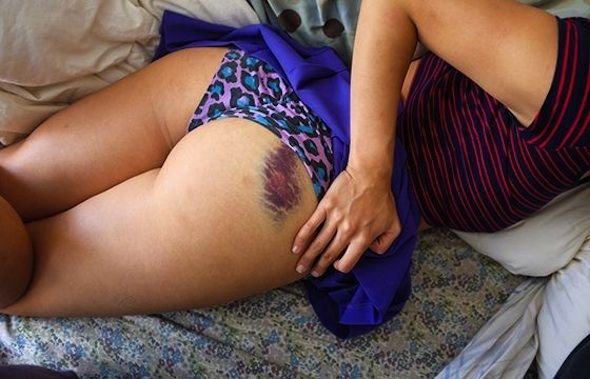
Photo by Vivian Fu
By sharing these intimate narratives, Fu is allowing herself to be both vulnerable and in control, through her power as an image-maker and self-voyeur. She attributes her openness to document herself and her sexuality, to our contemporary culture of sharing, since she grew up around the normalisation of these images, in both fine art contexts and the visual culture of our daily lives.
Fu’s multilayered images speak not only of her individual experiences as a young woman living in America today, but relate to a much larger narrative, concerned with themes of race, identity, sexuality, gender and relationships. Approaching her practice with a sense of fluidity and openness, Fu leaves her images open to exploration. As viewers, we are given the freedom to project our own lives onto the photographs, taking away new truths, as we work through our own personal narratives of identity and self.
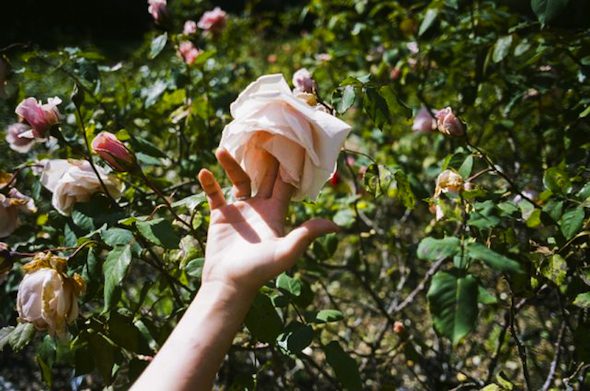
Photo by Vivian Fu
Celia Wickham: What was it that first drew you to photography as a medium? Is it something that you have always had a desire to focus on?
Vivian Fu: I don’t know if it’s something I’ve always had a desire to focus on. I think just because when you’re little and your parents introduce you to art, it’s always drawing or colouring or painting. I guess giving a kid a camera doesn’t really make a lot of sense. I liked drawing a lot when I was a kid, but I don’t think that that was really a passion or a thing that I was very interested in.
I ended up being drawn to photography just because I’m very interested in looking at things, and photography is an obvious way of being able to do that. Also, because I wanted to document things and my life.
Sometimes when I think about why I never do painting, for example, I realise that it just wouldn’t be fulfilling for me in the same way. I feel very little desire to do stuff like painting. There are other creative outlets that I’m interested in, but not necessarily passionate about, or would want to actively pursue. It’s just a thing that I like doing. Like styling for example, not that I’ve ever been hired as a stylist. I remember when I was younger I loved to decorate my room, and I never really realised that it’s a job you can actually do in real life.
CW: So when did you realise that photography was the thing that you were passionate about and wanted to pursue?
VF: I think at first I was just taking pictures in the same way that everybody does. My dad always really liked taking pictures, and I think I started taking an interest because he had a camera that he wasn’t using anymore. I got to use it when I was about 12, and I remember somebody else bought me an old Polaroid camera. I only had the pack of film that came with the camera, and then never got the film for it again. It wasn’t really until I was 17 that I became a lot more actively interested in photography. Although I don’t think I really took my pictures seriously, as an art practice, until I was maybe 21. It definitely took a while for me to view it as a thing that I was really passionate about, and wanted to actively pursue, instead of it just being a hobby.
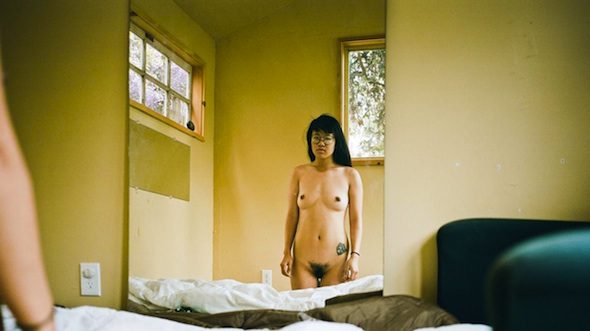
Photo by Vivian Fu
CW: As your photography practice developed what was it that prompted or inspired you to start documenting and taking pictures of yourself in particular?
VF: I’ve always taken pictures of myself. Probably because I started taking pictures around the time when MySpace was a big thing, which I think informed my photography a lot at the time. So it’s never really been a project for me: I didn’t sit down one day and think ‘I should take more pictures of myself’. It’s hard for me to separate that from photography, because taking pictures of myself is where it all started. I remember I started taking pictures of myself a lot after my sister had moved away to college, and I was on my own at home a lot. I actually found one of my first pictures recently, and I gave it to my boyfriend and told him to keep it in his wallet.
CW: Do you feel that through your work, and documenting yourself in intimate situations, you’ve been able to claim a sense of ownership over your body and your identity?
VF: I definitely think it functions as that. I feel like in the past I’ve talked a lot about that, as if that was my intention with the work. Now that I think about it more, that wasn’t my initial intention, even though I think subconsciously it’s a part of it. Obviously ownership has to be a part of it, but I think when I was taking pictures of myself, it was always something in the background. When I’m taking pictures I’m not consciously documenting my identity. I only later realised the link between my pictures and that sense of ownership. It’s always going to be a big part of the pictures, but it’s not necessarily the crux of them for me.
CW: Do you feel that your experiences of growing up as a young Asian woman have shaped the way in which you approach art making and photography?
VF: That’s hard to answer. I remember when I was 13 I asked one of my friends what it was like to be a boy, and he told me he didn’t know, because that was just the world he knew, and there was no frame of reference of how it would be different. It’s a similar thing, where I don’t know how my life would be different, or how exactly it has painted the way I see things. I remember I did a podcast recently where someone asked me if I grew up eating a lot of Taiwanese food. It was funny to me, because whatever food my parents cooked me, I didn’t look at it and think this is Taiwanese food. It was just dinner.
Also, in talking to other people I think there are definitely experiences that I’ve had that other people haven’t encountered, that have shaped the way I view the world in some way. Obviously men sexualise women in general, but I think I’ve experienced this different type of sexualisation as an Asian woman. Like the niche section on a porn website, there’s never a section for just white women. I live in San Francisco where there are a lot of Asian people, and it’s a very progressive city, so I don’t really experience that type of harassment anymore. Although recently I was stopped in the street by a guy telling me that he’d seen me around and just had a thing for Asians. It’s things like that. Women always get harassed in the street, but there’s a specific type of harassment I encounter. Experiences like that definitely inform the way that you view the world.
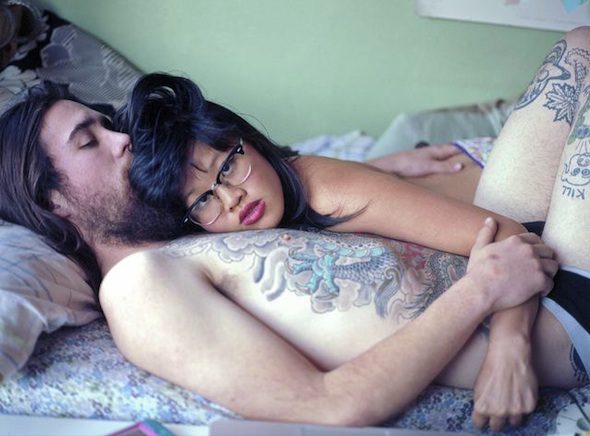
From the series ‘Me and Tim’, Photo by Vivian Fu
CW: Throughout your work there is a real sense of intimacy, vulnerability and sensuality. In particular, your series with your boyfriend, Me and Tim. Can you talk more about that?
VF: I think it’s probably because you want to hold onto things that you think are special or worth remembering. I don’t go to work and think I want to take pictures of myself at work, because it’s not something that I really care about a lot, or think is photographic. I think that art making in general is very informed by our experiences of visual culture, especially now. For me, images that depict the sorts of intimacies I explore in my work have been normalised and put into this fine art context. So many photographers have been doing it before me, and I’ve been influenced and inspired by their photographs. I never felt like these images couldn’t be art. I also just happen to have a partner that was open to me taking pictures of our intimate moments.
I’m a very romantic person. Not necessarily in a relationship kind of way, but more my rose-tinted view of the world. It definitely plays a role in the types of things I want to take pictures of. My friend Molly and I recently did a photography talk in L.A., and we were driving down from San Francisco together and listening to music. She comes from this punk, hardcore background, in terms of music that she likes. Whereas I grew up listening to indie music, a type of music I find to be very romantic, and full of sensual sounds. I think it definitely relates to the pictures that I take of people, and the things that I find to be sensuous.
My images are a lot about narrative, and the people and the relationships between them play a large part in that. Each of the individual pictures I take is able to satisfy a specific need or a desire that I have within photography. Overall, it’s just this large narrative about me, and the relationships I have with people, and a lot of those relationships are intimate ones. So my work can mean a lot of things. It can be about being a woman, it can be about my background, it can be about intimacy and vulnerability.
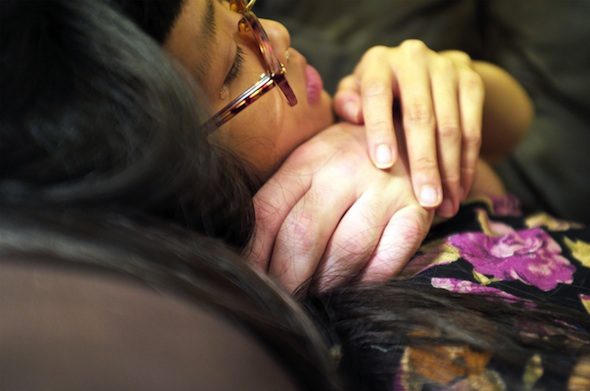
Photo by Vivian Fu
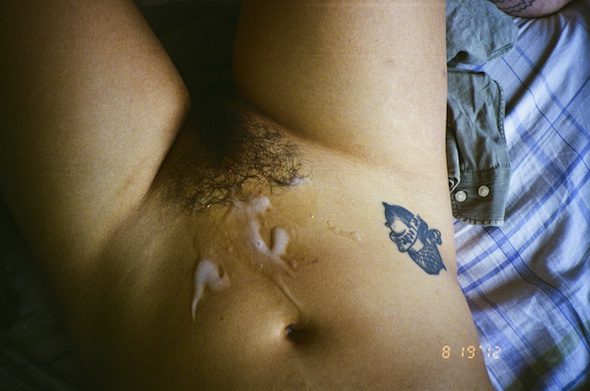
Photo by Vivian Fu
CW: What was it that prompted you to share these intimate moments of yourself?
VF: We grew up in a time when people share a lot of stuff on the internet, like someone posting a picture saying “these are the sex toys that I bought”, or “this is the guy that I went on a date with and these are all the things about him.” I think it’s a cultural thing, that sharing is normalised now. So I have never felt anxiety about sharing personal images. In general I don’t really like to talk about myself a lot on the internet because I do want there to be some sort of separation, where some things are private, and I think there are things that I know I don’t want to take pictures of.
But I don’t feel vulnerable in my pictures. I don’t know if that’s because I’m the one that’s making them, but I recognise that the pictures can be about that for someone else viewing them. It’s like this interview I just read with Olivia Bee she says that when she puts her photographs out in to the world, it is up to people to project whatever they want onto them. That’s a big part of the story, too.
Artist Info
Writer Info
Celia Wickham is a visual artist and filmmaker, and is the editor of the feminist zine Milk and Honey.

























